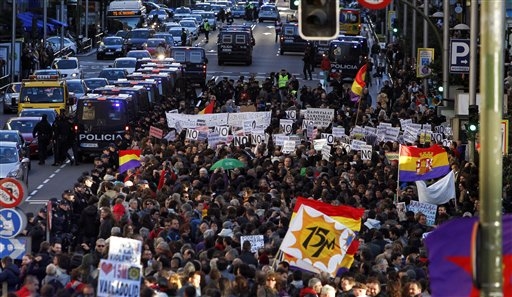
MADRID (AP) — Several thousand people marched to Spain's parliament in an anti-austerity protest Saturday, but were held back from surrounding the building by metal rail barricades and a large police presence.
The "Surround parliament" protest group had called on people to gather at Plaza de Espana and march on the legislature to express their opposition to spending cuts and tax hikes introduced by Prime Minister Mariano Rajoy's government.
Police on horseback and with dogs had earlier arrived at Neptuno fountain next to parliament in preparation for crowd control duties as the protesters marched 2.3 kilometers (1.4 miles) from the muster point.
Protesters were accompanied along the route of the march by a strong police escort, including vans with reinforced windows.
Demonstration organizers said protesters will be asked to hold a minute of silence with their backs turned on parliament to express their disapproval of government public sector cuts while offering financial support to ailing banks.
"And now they are going to give banks a bailout, rescue them as if they were princesses," said Alan Pipo, 70.
"They should be put out on the streets, just like all those families who are being evicted from their homes because they are unable to keep up with mortgage payments."
Thousands also marched in the Barcelona to protest education cuts in the northeastern region of Catalonia.
Earlier, about 3,000 off-duty police officers had also demonstrated to protest the government's austerity measures, including the cancellation of their Christmas bonuses.
The police protest blocked one of the capital's central boulevards opposite the Interior Ministry. On-duty police officers watched as their off-duty colleagues demonstrated by throwing fireworks and chanting slogans.
A demonstrator was injured when a firework he was set to throw exploded in his hand. Many protesters draped themselves in Spanish flags and added to the ear-splitting noise by blowing their police-issued whistles.
Preparing for his return from a business promotion trip to India, King Juan Carlos told journalists that, "From outside, Spain looks better, you come away with a better image." He added, "Inside, you want to weep, it's all woes, but we have to overcome them."
Since being voted to office in general elections in November, Rajoy has hiked taxes, cut spending, including a wage-cut for civil servants, and introduced stinging labor reforms in a bid to persuade investors and international authorities that he can manage Spain's finances without the need for a full-blown bailout.
However, Spain's public finances have been overwhelmed by the cost of rescuing some of its banks and regional governments, many of which have experienced heavy losses following a property sector crash in 2008.
One Spaniard in four is unemployed as the economic crisis tightens its grip. The government is under pressure to seek aid to ease debts while the country sinks into its second recession in three years.
Economic output has contracted for five quarters in a row and Spain's troubled banks have been granted a €100 billion ($130 billion) loan facility by the 17 eurozone countries.
"We can't go on like this. We have a right to a public health system and quality schools for our kids," said Paloma Martinez, 62. "We are indignant and have no fear."